
|
| People stand on an army tank at Ataturk airport in Istanbul |
ISTANBUL — An attempted Turkish military coup appeared to crumble in the early hours of Saturday after crowds answered President Tayyip Erdogan’s call to take to the streets to support him.
Erdogan, who had been holidaying on the coast when the coup was launched, flew into Istanbul before dawn on Saturday and was shown on TV appearing among a crowd of supporters outside the airport, which the coup plotters had failed to secure.
The uprising was an “act of treason”, and those responsible would pay a heavy price, he later told reporters at a hastily arranged news conference. Arrests of officers were under way, and it would go higher up the ranks, culminating in the cleansing of the military.
Gunfire and explosions had rocked both the main city Istanbul and capital Ankara in a chaotic night after soldiers took up positions in both cities and ordered state television to read out a statement declaring they had taken power.
But by early Saturday, Reuters journalists saw around 30 pro-coup soldiers surrender their weapons after being surrounded by armed police in Istanbul’s central Taksim square.
They were taken away in police vans as a fighter jet repeatedly screeched overhead at low altitude, causing a boom that shook surrounding buildings and shattered windows.
A successful overthrow of Erdogan, who has ruled Turkey since 2003, would have marked one of the biggest shifts in the Middle East in years, transforming one of the most important U.S. allies while war rages on its border. A failed coup attempt could still destabilize a pivotal country.
Before returning to Istanbul, Erdogan appeared in a video call to the studio of the Turkish sister channel of CNN, where an announcer held up a mobile phone to the camera to show him. He called on Turks to take to the streets to defend his government and said the coup plotters would pay a heavy price.
By the early hours of Saturday morning, lawmakers were still hiding in shelters inside the parliament building in Ankara, which had been fired on by tanks. Smoke rose up from nearby, witnesses said. An opposition MP told Reuters parliament was hit three times and that people had been wounded.
A Turkish military commander said fighter jets had shot down a helicopter used by the coup plotters over Ankara. State-run Anadolu news agency said 17 police were killed at special forces headquarters there.
As the night wore on, momentum turned against the coup plotters. Crowds defied orders to stay indoors, gathering at major squares in Istanbul and Ankara, waving flags and chanting.
“We have a prime minister, we have a chief of command, we’re not going to leave this country to degenerates,” shouted one man, as groups of government supporters climbed onto a tank near Istanbul’s Ataturk airport.
Erdogan and other officials blamed loyalists of a U.S.-based cleric for the coup attempt; his movement denied any part in it.
The United States declared its firm backing for Erdogan’s government hours after the coup was declared. Secretary of State John Kerry said he phoned the Turkish foreign minister and emphasized “absolute support for Turkey’s democratically elected, civilian government and democratic institutions.”
Early in the evening the coup appeared strong. A senior EU source monitoring the situation said: “It looks like a relatively well orchestrated coup by a significant body of the military, not just a few colonels. They’ve got control of the airports and are expecting control over the TV station imminently. They control several strategic points in Istanbul.
“Given the scale of the operation, it is difficult to imagine they will stop short of prevailing.”
One European diplomat was dining with the Turkish ambassador to a European capital when guests were interrupted by the pinging of urgent news on their mobile phones.
“This is clearly not some tinpot little coup. The Turkish ambassador was clearly shocked and is taking it very seriously,” the diplomat told Reuters as the dinner party broke up. “However it looks in the morning, this will have massive implications for Turkey. This has not come out of nowhere.”
Turkish officials blamed the attempted coup on followers of Fethullah Gulen, an influential cleric in self-imposed exile in the United States who once supported Erdogan but became a nemesis. The pro-Gulen Alliance for Shared Values said it condemned any military intervention in domestic politics.
After serving as prime minister from 2003, Erdogan was elected president in 2014 with plans to alter the constitution to give the previously ceremonial presidency far greater executive powers.
Turkey has enjoyed an economic boom during his time in office and has dramatically expanded its influence across the region. But opponents say his rule has become increasingly authoritarian.
His AK Party, with roots in Islamism, has long had a strained relationship with the military and nationalists in a state that was founded on secularist principles after World War One. The military has a history of mounting coups to defend secularism, but has not seized power directly since 1980.






Leave a Reply